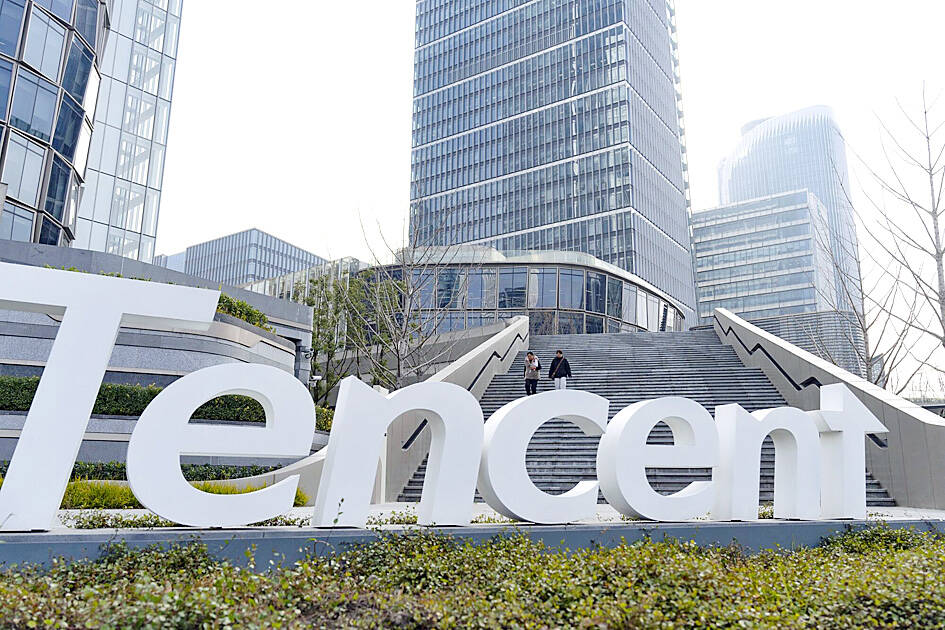Tencent Holdings Ltd (騰訊) said yesterday its Weixin messaging app, China’s largest, is allowing some users to search via DeepSeek’s (深度求索) artificial intelligence (AI) model, as firms race to link up with the AI start-up that has grabbed global attention.
In a beta test, Weixin is testing access to DeepSeek for searches, Tencent said in an e-mailed statement to Reuters.
The move by the Chinese tech giant is notable as integrating DeepSeek brings in an external AI platform, while tech firms compete fiercely in developing the most advanced AI.

Photo: Qilai Shen, Bloomberg
Weixin uses Tencent’s proprietary Hunyuan-Large language model to enrich its AI search, a spokesperson said.
Tencent is exploring the integration of multiple products with DeepSeek, including Tencent Cloud AI Code Assistant and Tencent Yuanbao, another AI assistant app, a person with knowledge of the matter said.
DeepSeek is being tested by Weixin, which serves domestic users, not its sister app WeChat, which targets overseas users. The two had a combined 1.38 billion users at the end of September last year.
DeepSeek last month upended the AI world, launching a free AI assistant that it says uses less data at a fraction of the cost of incumbent services. It quickly overtook US rival ChatGPT in downloads from Apple Inc’s App Store.
Among Chinese companies seeking to capitalize on DeepSeek’s potential breakthrough, automaker Great Wall Motor Co (長城汽車) and leading telecoms providers are integrating the AI model released by DeepSeek into their offerings.
In related news, Elon Musk’s AI start-up xAI is to release its Grok 3 chatbot today, with the billionaire describing it as the “smartest AI on Earth,” the Tesla Inc CEO said in a post on X.
Musk teased the planned launch of Grok 3 chatbot during a video conference at the World Government Summit in Dubai on Thursday, calling it an AI model that would outperform every competing tool that’s been released so far.
The model was trained on synthetic data and is capable of reflecting on mistakes that it makes by going back and forth through the data to achieve logical consistency, Musk said.
Additional reporting by Bloomberg

Zhang Yazhou was sitting in the passenger seat of her Tesla Model 3 when she said she heard her father’s panicked voice: The brakes do not work. Approaching a red light, her father swerved around two cars before plowing into a sport utility vehicle and a sedan, and crashing into a large concrete barrier. Stunned, Zhang gazed at the deflating airbag in front of her. She could never have imagined what was to come: Tesla Inc sued her for defamation for complaining publicly about the vehicles brakes — and won. A Chinese court ordered Zhang to pay more than US$23,000 in

Taiwan Semiconductor Manufacturing Co (TSMC, 台積電) yesterday said that its investment plan in Arizona is going according to schedule, following a local media report claiming that the company is planning to break ground on its third wafer fab in the US in June. In a statement, TSMC said it does not comment on market speculation, but that its investments in Arizona are proceeding well. TSMC is investing more than US$65 billion in Arizona to build three advanced wafer fabs. The first one has started production using the 4-nanometer (nm) process, while the second one would start mass production using the

A TAIWAN DEAL: TSMC is in early talks to fully operate Intel’s US semiconductor factories in a deal first raised by Trump officials, but Intel’s interest is uncertain Broadcom Inc has had informal talks with its advisers about making a bid for Intel Corp’s chip-design and marketing business, the Wall Street Journal reported, citing people familiar with the matter. Nothing has been submitted to Intel and Broadcom could decide not to pursue a deal, according to the Journal. Bloomberg News earlier reported that Taiwan Semiconductor Manufacturing Co (TSMC, 台積電) is in early talks for a controlling stake in Intel’s factories at the request of officials at US President Donald Trump’s administration, as the president looks to boost US manufacturing and maintain the country’s leadership in critical technologies. Trump officials raised the

From George Clooney to LeBron James, celebrities in the US have cashed in on tequila’s soaring popularity, but in Mexico, producers of the agave plant used to make the country’s most famous liquor are nursing a nasty hangover. Instead of bringing a long period of prosperity for farmers of the spiky succulent, the tequila boom has created a supply glut that sent agave prices slumping. Mexican tequila exports surged from 224 million liters in 2018 to a record 402 million last year, according to the Tequila Regulatory Council, which oversees qualification for the internationally recognized denomination of origin label. The US, Germany, Spain,